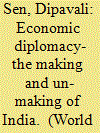| Srl | Item |
| 1 |
ID:
104381


|
|
|
|
|
| Publication |
Berlin, Springer, 2008.
|
| Description |
vii, 321p.
|
| Series |
Political economy of the Asia Pacific
|
| Standard Number |
9783540748878
|
|
|
|
|
|
|
|
|
|
|
|
Copies: C:1/I:0,R:0,Q:0
Circulation
| Accession# | Call# | Current Location | Status | Policy | Location |
| 055976 | 352.01095/AGG 055976 | Main | On Shelf | General | |
|
|
|
|
| 2 |
ID:
138364


|
|
|
|
|
| Summary/Abstract |
On the global scene, India has recently been playing tactics of Economic Diplomacy. A statecraft, Economic Diplomacy is an attempt to arrive at some agreement between nations that was not coming about by itself. It involves negotiation and tries to prevent any violent conflict like war. It is extra-market, and takes the countries concerned beyond market equilibrium solutions indicated by mainstream economic theory. This article points out that it is in contrast, if not in contradiction, with prevalent theories on foreign trade. In 2004 the Association of Indian Diplomats had traced it to countries of Europe but this article emphasizes that economic diplomacy was practiced in India itself in epic as well as mediaeval times.
|
|
|
|
|
|
|
|
|
|
|
|
|
|
|
|
| 3 |
ID:
133646


|
|
|
|
|
| Publication |
2014.
|
| Summary/Abstract |
This article explores the adjustment of wage bargaining institutions to international trade in Germany. Embracing IPE as opposed to CPE lenses yields a novel interpretation of change in the institution of wage bargaining. Export dependence of a sector, we argue, has destabilizing effects for industry-wide bargaining by sparking an intra-sectoral cleavage between domestic- and export-oriented enterprises. Specifically, the greater the degree of export dependence of a sector, the greater the degree to which domestic-oriented enterprises within that sector will abandon collective bargaining. We also explain how workplace employee representation through works councils mitigates this effect, such that the presence of works councils helps domestically oriented firms to hold to collective bargaining agreements in the face of a sector's deepening exposure to export markets. These claims find empirical support in the history of labor relations developments in the metal industry and, especially, in extensive analysis of a cross-section of establishments. Our findings attribute major responsibility to the firms driving globalization for undermining collective bargaining institutions and suggest that economic globalization is a cause of dualization. In all, the article provides fresh ammunition for a version of globalization-induced institutional convergence. [Correction added after online publication on May 28, 2014: "conversion" changed to "convergence" in preceding sentence.]
|
|
|
|
|
|
|
|
|
|
|
|
|
|
|
|